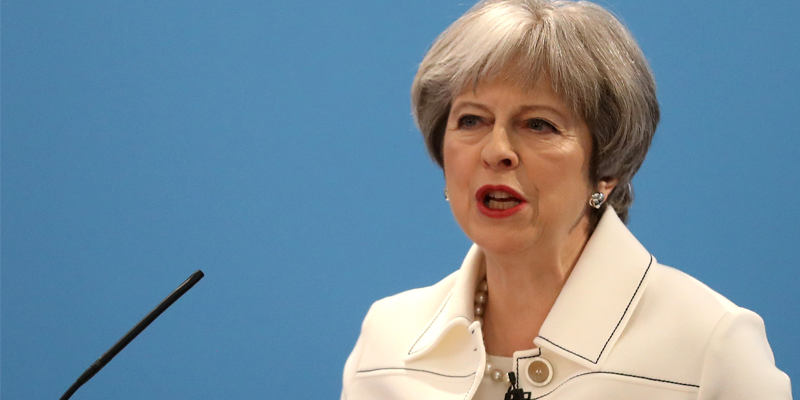Theresa May has long insisted that Britain should not be part of any customs union when we leave the European Union. But she has also said she wants ‘frictionless trade’ with the EU and to ensure there is no hard border between Northern Ireland and the Irish Republic. Her critics say she can’t have one without the other and she faces formidable Parliamentary opposition. So should Britain try to stay in the customs union or not?
The Customs Union is one of the most fundamental aspects of the EU. It eliminates all tariffs on the trade of goods between member states and it imposes a common external tariff on goods imported to all members states from countries outside the EU. The European Commission is the sole negotiator of trade deals between EU member states and other countries.
During the referendum campaign the Leave camp made much of the running with their slogan that Britain should ‘take back control’ – including control of trade and immigration policy. It would provide the opportunity for ‘global Britain’ once again to negotiate its own trade deals with the rest of the world. Because trade opportunities were expanding much more quickly outside the EU than inside there would be a big boost to Britain’s growth prospects, it was claimed. Leaving the customs union was vital for this to happen.
Sure enough, when Theresa May (a lukewarm ‘Remainer’) became prime minister after the referendum, she promised that Brexit would mean Brexit and eventually defined this, in part, as requiring that Britain would leave the customs union. But she also knew that this would not be without its own problems.
In the first place, it would involve (in theory at least) the imposition of tariff barriers between Britain and its old partners in the EU. These might be negotiated away in a trade deal between the two but there would still be the problem of Britain becoming a back door route for other countries to evade the EU’s common tariff to get their goods into the European market. To avoid this might require new border controls between the United Kingdom and the EU. The only land border is between Northern Ireland and the Irish Republic and it was feared that the reintroduction of a ‘hard border’ here might jeopardise the Good Friday Agreement of 1998 which ended the sectarian violence of the previous thirty years.
How to square the circle of leaving the customs union while avoiding these possible consequences has been one of the chief difficulties of the Brexit negotiations. It has led some to argue that, having left the customs union, Britain should promptly negotiate a (new) customs union, in effect replicating the existing one. That way there could be frictionless trade, no hard borders and no renewed threat to peace in Northern Ireland.
But Brexiteers are outraged by the idea. Membership of a new customs union would stop in its tracks all attempts by Britain to negotiate its own trade deals in the world. Furthermore, because Britain was no longer part of the EU, it would have to accept the terms of any trade deals the EU struck with other countries without having any say of its own in the process (as Turkey, a non-EU state with a customs union agreement with the EU has to do now). But most of all, they claim, this would be a betrayal of those who voted to leave the EU because Britain would end up half in and half out of the EU. In short, it would be a deeply undemocratic outcome.
Supporters of the idea are unimpressed by these objections. They concede that Britain would not be able to negotiate its own trade deals but they argue that the supposed benefits are, at best, overstated. A Whitehall study, leaked in February, suggested that the gains from Britain being able to negotiate its own trade deals with the likes of the US, China and Australia amounted to only about 0.7% of national income, while the potential loss of free trade with the EU might cost Britain 1% in the longer term. They point out too that goods amounts to only 20% of the economy, leaving the 80% that consists largely of services unaffected, as they are not covered by the customs union. They also claim that Britain is a much more powerful trade partner to the EU than Turkey and ought to be able to negotiate some form of British participation in future EU trade deals with other countries even while being outside the EU itself.
As for the democratic charge, they say that even with a new customs union agreement, Britain would still be leaving the EU and still be able to ‘take back control’ over many other aspects of policy.
The Prime Minister has been trying to get round having to make a choice between these options by coming up with another solution. The one she is believed to favour, a ‘customs partnership’, involves Britain acting as an agent for the EU in collecting tariffs at its own borders on the EU’s behalf and passing them on, leaving businesses believing they have been charged too high a tariff to claim the money back. But this has been rejected by many businesses as impractical and by the EU as ‘magical thinking’. The Financial Times dismissed it as failing ‘to pass the laugh test’ and some of her most pro-Brexit cabinet ministers are reported to be against it too.
Some observers believe it is no more than a ploy to buy time. But time may be running out as the issue may well face a parliamentary crunch in the late spring. Labour has already changed its position, abandoning its previous opposition to membership of the customs union in favour of belonging to a customs union. Last week the government was defeated in the House of Lords by an unexpectedly large majority of 123 on a motion effectively proposing that Britain be part of a customs union.
This week the Commons will debate a non-binding motion on the issue but a more crucial vote is likely to take place in May or June. Around ten pro-Remain Tory MPs are already believed to be prepared to defy the government but more may be ready to join them by then, especially of the Conservatives get the expected drubbing in the local elections in May. It would take only a few more to see the government defeated.
Some are speculating that despite the Prime Minister’s continuing insistence that she is determined that Britain should leave the customs union, a defeat might actually be helpful to her. A Downing Street aide was reported recently as saying that ‘we would not be crying into our beer’ if the government lost the vote. The cold political calculation here is that while Mrs May cannot herself advocate staying in a customs union, as that would lead immediately to cabinet resignations and an end to the fragile truce within the Conservative Party, defeat by parliament would be a very different thing. The Prime Minister would then claim she was only ‘reluctantly’ now pursuing membership of a customs union and doing so only because instructed to do so by Parliament. She might also add that since the most avid Brexiteers in her own party are also the keenest advocates of parliamentary sovereignty, they had better follow her lead.
In short, defeat in Parliament would allow the Prime Minister to escape her political fix by transferring it to the Brexiteers on the Tory benches. Their choice would then be between acting on their outrage, by turning on the Prime Minister, forcing a leadership election, and risking a general election with the possibility of seeing Jeremy Corbyn come to power – an outcome that would not only horrify them on many grounds but would ensure that Britain stayed in a customs union; or knuckling down and accepting the fait accompli.
But we are not there yet and may not ever get there because the Prime Minister may not end up being defeated by Parliament. In that event, what is the best policy? Should Britain stay in some form of customs union or not? Do you think being outside a customs union is a threat to the Good Friday Agreement or not? Do you think British prosperity will be promoted more by being inside a customs union or outside one? And if we do end up being in a customs union, would that constitute a betrayal of the referendum result, or not?
Let us know your views.
Image Getty











